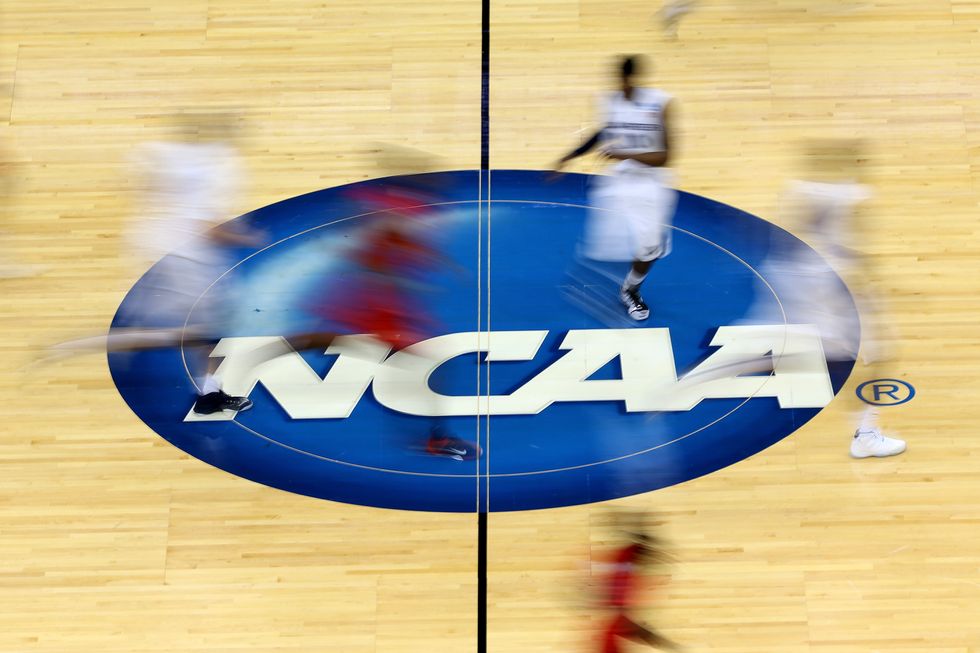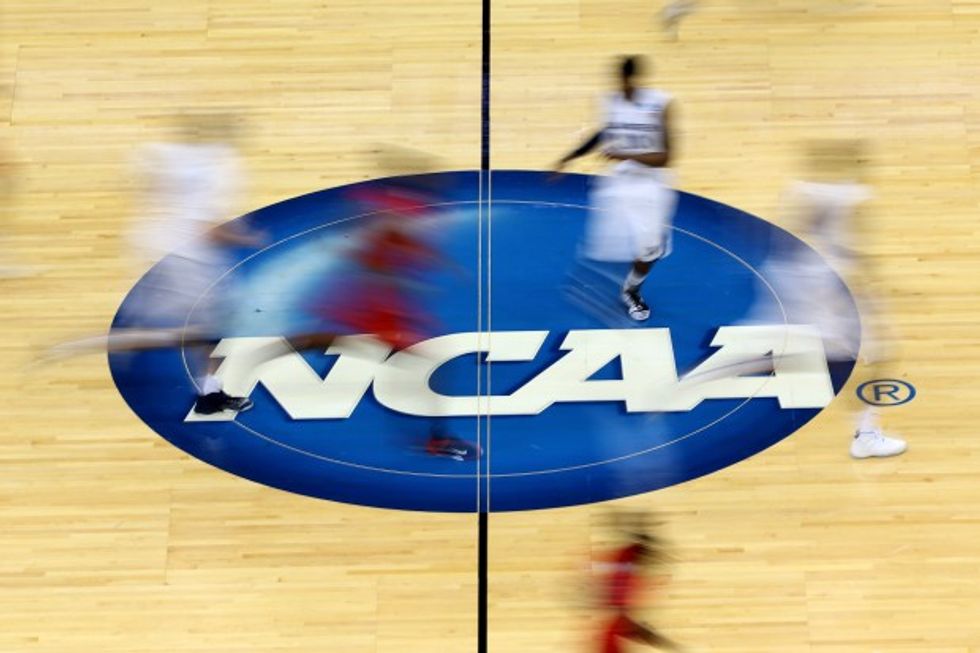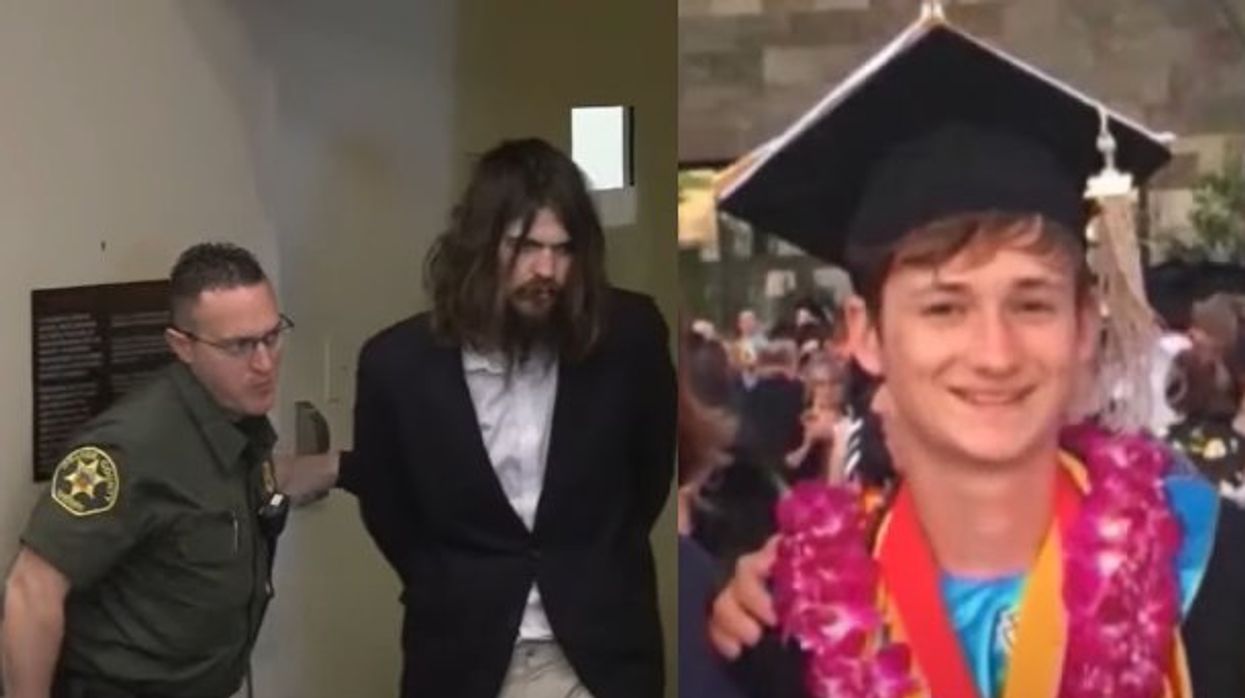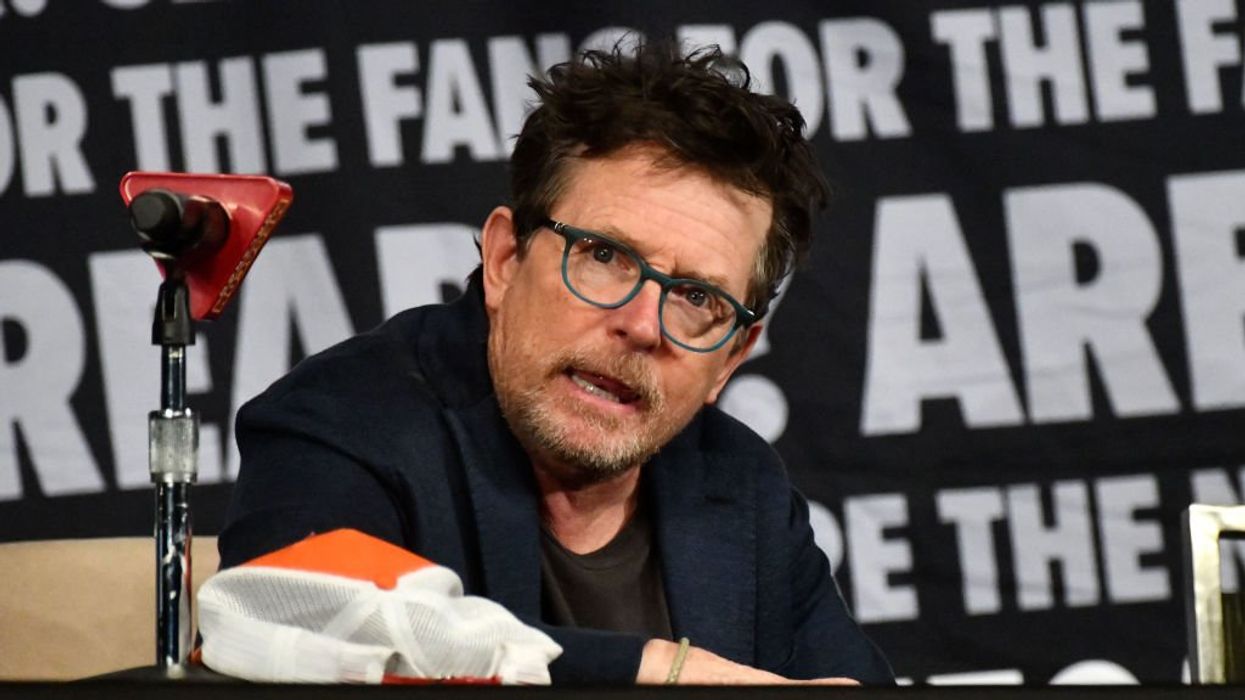Should the NCAA allow ex-cons to coach in the high school tournaments that it sponsors?
One thing is certain: The decision should be left to the NCAA officials who oversee student playing fields and basketball courts, not courts of law misapplying federal civil rights statutes.
For the past five years, the NCAA has imposed a blanket ban on felons coaching in NCAA-sanctioned high school events. The rule – applying to nonviolent and violent offenders alike, regardless of how old the offense – has sparked continuous debate, with credible arguments on both sides.
 Mississippi Rebels and Xavier Musketeers players run by the logo at mid-court during the second round of the 2015 NCAA Men's Basketball Tournament at Jacksonville Veterans Memorial Arena on March 19, 2015 in Jacksonville, Florida. (Photo: Mike Ehrmann/Getty Images)
Mississippi Rebels and Xavier Musketeers players run by the logo at mid-court during the second round of the 2015 NCAA Men's Basketball Tournament at Jacksonville Veterans Memorial Arena on March 19, 2015 in Jacksonville, Florida. (Photo: Mike Ehrmann/Getty Images)
But whatever you think about the prohibition as a matter of policy, a current effort to scuttle it as illegal should be ruled out of bounds.
A federal lawsuit, Hardie v. NCAA, seeks to brand the NCAA’s ban as a violation of the 1964 Civil Rights Act. Currently before the Ninth U.S. Circuit Court of Appeals, the suit commits a foul against commonsense interpretation of anti-discrimination law, and against constitutional principles of equal protection and equal rights.
Dominic Hardie is an AAU high-school level coach from Houston who has been barred from NCAA-certified events because of his 2000 conviction for possession of cocaine. He argues that he has turned his life around and should be allowed to offer his example to student athletes.
But instead of confining his case against the ban to the court of public opinion, he headed to court with a legal theory that twists federal civil rights law and could actually end up promoting race-based discrimination.
Hardie, who is African-American, is alleging that the NCAA policy violates Title II of the Civil Rights Act of 1964, which outlaws discrimination in places of public accommodation such as restaurants and hotels.
Now, Title II clearly prohibits intentional discrimination, punishing the refusal to provide services on the basis of race.
But Hardie is not alleging that the NCAA is intentionally trying to keep black coaches out of its high school tournaments.
Rather, Hardie’s lawsuit targets the NCAA ban on convicted felons as coaches under a theory of liability known as “disparate impact” – a theory that bases a finding of “discrimination” on statistical outcomes rather than proof of discriminatory intent.
The argument proceeds in two steps. First, Hardie points out that since a greater percentage of blacks have been convicted of felonies compared to other races, the NCAA policy affects blacks disproportionately. Second, Hardie says that this showing of an adverse effect on African Americans as a group is sufficient for an initial showing of a civil rights violation, even without any allegation of intentional bias.
The stark contrast between the theory of disparate impact liability and traditional notions of equal protection under the law shows why Hardie should lose. Perfectly neutral policies that treat everyone equally regardless of color – for example, choosing members of a sports team based on skill - can often lead to disproportionate outcomes for different racial groups. In some cases, the only way to avoid such a disparate impact would be to engage in unequal treatment such as discriminating for or against individuals by color, to meet an arbitrary racial formula.
The Supreme Court’s concern with such a perverse result was highlighted in a 2009 decision dealing with promotional exams for New Haven firefighters. Several firefighters, who scored well enough on the exam to earn promotions, brought suit after the city ordered a do-over because too many of the successful test-takers had been white. As Chief Justice John Roberts asked New Haven’s lawyer at oral argument: Must the Court allow New Haven to conduct do-over after do-over until it resulted in the City’s preferred racial balance?
Disparate impact lawsuits have led to the imposition of racial quotas through both court orders and consent decrees. A racial quota means that you are awarded a benefit (e.g. a job) if you are a member of the favored race, and turned down if you’re not.
Disparate impact theory is especially problematic when it is applied to public accommodations, the area where Hardie’s lawsuit seeks to employ it. Plenty of nondiscriminatory business policies can yield differential effects, with no motive to discriminate. For example, at an expensive restaurant, more members of some racial groups might find it unaffordable, compared to others. The same with basketball tickets: Depending on the cost, there could be a “disparate impact” in terms of the racial makeup of the fans who fill the seats. Yet few would argue that restaurants, or hotels, or sporting events, should be held liable under federal anti-discrimination law for charging everyone the same.
The Ninth Circuit should blow the whistle on Hardie’s lawsuit. Civil rights law is about stopping intentional discrimination, not prohibiting colorblind policies simply because they don’t meet an arbitrary statistical model.
Wencong Fa is an attorney with Pacific Legal Foundation. He submitted an amicus brief to the Ninth Circuit opposing the “disparate impact” challenge to the NCAA policy.
–
TheBlaze contributor channel supports an open discourse on a range of views. The opinions expressed in this channel are solely those of each individual author.


 Mississippi Rebels and Xavier Musketeers players run by the logo at mid-court during the second round of the 2015 NCAA Men's Basketball Tournament at Jacksonville Veterans Memorial Arena on March 19, 2015 in Jacksonville, Florida. (Photo: Mike Ehrmann/Getty Images)
Mississippi Rebels and Xavier Musketeers players run by the logo at mid-court during the second round of the 2015 NCAA Men's Basketball Tournament at Jacksonville Veterans Memorial Arena on March 19, 2015 in Jacksonville, Florida. (Photo: Mike Ehrmann/Getty Images)


